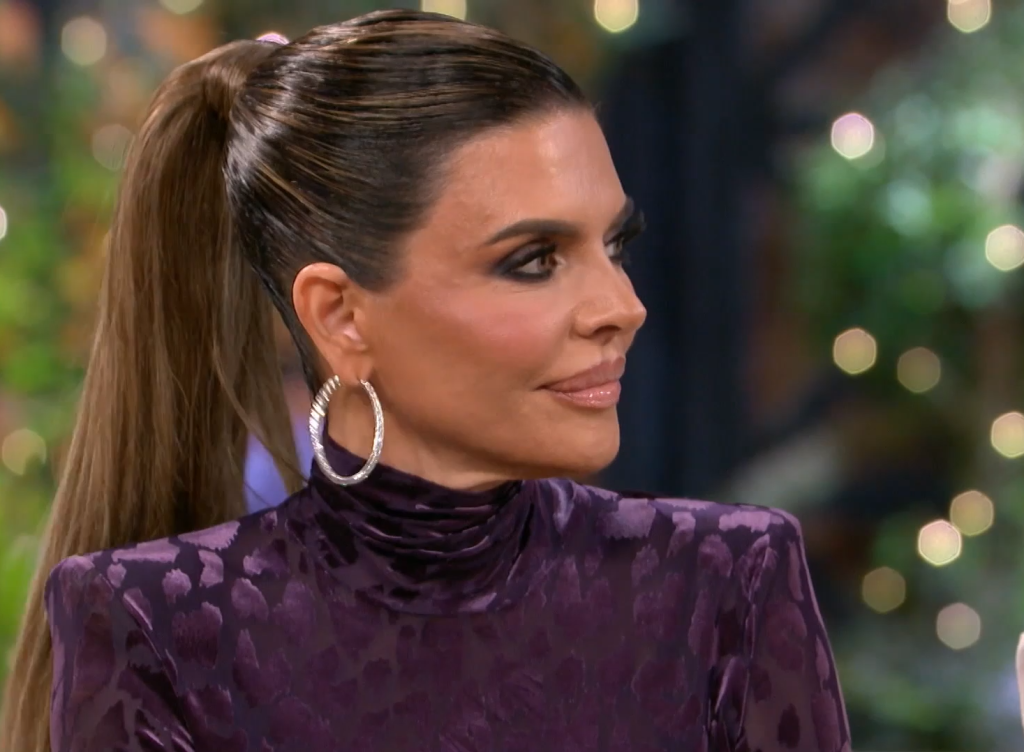
Lisa Rinna Postpartum Depression: Star Reveals "I'll Kill You" Hallucinations
Lisa Rinna Postpartum Depression: Star Reveals “I’ll Kill You” Hallucinations
On their ‘Let’s Talk About The Husband’ podcast, Lisa Rinna and Harry Hamlin openly discussed her struggles with postpartum depression following daughter Amelia’s birth. (Image Credit: YouTube)
Former Real Housewives of Beverly Hills star Lisa Rinna has bravely shared her harrowing experience with postpartum depression after the birth of her daughter Amelia Gray Hamlin in 2001. In a candid conversation on her podcast with husband Harry Hamlin, Rinna revealed shocking details about the violent thoughts and hallucinations she experienced, including telling her husband “I’ll kill you” and having visions of driving into walls. Her Lisa Rinna postpartum depression journey highlights the often misunderstood severity of this condition and the importance of proper medical intervention.
Table of Contents
Lisa Rinna’s Postpartum Warning Signs to Harry Hamlin
The Lisa Rinna postpartum depression story took a concerning turn when she and Harry were on vacation with their newborn daughter in Canada. During a recent episode of their Let’s Not Talk About The Husband podcast, Harry Hamlin recalled a chilling moment that signaled the severity of his wife’s condition.
“I’ll never forget after Amelia was born, we were at the cabin in Canada,” Harry recalled. “We went to a movie one day in Bracebridge, and you said, ‘I’m gonna kill you.'”
Recognizing the seriousness of the situation, Hamlin immediately responded by suggesting they contact her OB-GYN. This moment occurred while they were sitting outside a theater, demonstrating how Lisa Rinna’s postpartum depression symptoms could manifest unexpectedly in everyday settings.
Though Rinna admitted she didn’t recall that specific exchange, Hamlin remembered the concerning details vividly: “You said, ‘You better watch out. I feel like killing you.’ You said, ‘Keep the knives in a drawer.'”

Harry Hamlin has been supportive throughout Lisa’s mental health struggles, including her postpartum depression experiences. (Image Credit: Bravo)
The Disturbing Hallucinations and Violent Thoughts
The Lisa Rinna postpartum depression experience involved frightening hallucinations that went beyond typical baby blues. Rinna confirmed the disturbing nature of these visions during their podcast conversation.
“I was having these horrible visions. It’s true,” Lisa described. “I was having horrible hallucinations of killing people. And I needed to take the knives out of the house. And I also had horrible visions of driving the car into a brick wall.”
However, Rinna made an important clarification about the nature of her thoughts: “I did not have horrible visions about hurting the baby in any way, shape or form. It wasn’t about that.” This distinction is crucial in understanding the varied manifestations of postpartum depression, which can include intrusive thoughts that don’t necessarily involve harm to the infant.
Understanding Postpartum Intrusive Thoughts
While Lisa Rinna’s postpartum depression involved violent thoughts directed at herself and others, it’s important to note that postpartum mental health issues manifest differently in each person. Some experience thoughts about harming their baby without any intention to act on them, while others may have self-destructive thoughts or thoughts of harming others. These intrusive thoughts are symptoms of illness, not indicators of someone’s character or intentions.
Rinna elaborated on her experience: “It was about hopelessness, darkest depression, and these horrible visions, hallucinations. It was the knives and it was driving the car into the brick wall.” This comprehensive description helps paint a fuller picture of the mental health crisis she was experiencing after giving birth.

Before sharing her postpartum story, Lisa Rinna was known for her candor on RHOBH. (Image Credit: Bravo)
How Antidepressants Changed Lisa Rinna’s Postpartum Experience
The turning point in Lisa Rinna’s postpartum depression journey came when her doctor prescribed antidepressants, which she describes as having worked “instantly” to alleviate her symptoms. “It changed the whole thing. It changed the game instantly,” she shared during the podcast.
However, as is common with antidepressant medications, “instantly” actually meant about three weeks—the typical time these medications require to reach full effectiveness in a person’s system. This waiting period was excruciating for the family.
“Here we are on an island with a baby and a 3-year-old. I was out of my mind,” Lisa described of the “f–king nightmare challenge” of waiting for the medication to take effect.
The Importance of Professional Treatment
Lisa Rinna’s successful treatment of her postpartum depression highlights the critical importance of seeking professional help. Medication can be life-saving for those experiencing postpartum mental health issues, and Rinna’s willingness to share this part of her story may encourage others to seek the help they need.

Lisa Rinna’s openness about mental health issues, including her postpartum depression, has made her a voice for awareness. (Image Credit: Bravo)
Her First Undiagnosed Postpartum Depression
What makes the Lisa Rinna postpartum depression story even more poignant is that this wasn’t her first experience with the condition. After the birth of her first daughter, Delilah, in 1998, Rinna also suffered from postpartum depression but didn’t receive treatment.
“I had postpartum 15 months and didn’t do anything about it,” she recalled. “Didn’t know I had it, didn’t know what to do.”
Unlike her experience after Amelia’s birth, Rinna didn’t have the violent visions the first time, but she still felt the overwhelming “hopelessness” characteristic of depression without understanding its cause. This earlier undiagnosed episode highlights the importance of awareness and education about postpartum depression symptoms.
Signs of Postpartum Depression to Watch For
Learning from Lisa Rinna’s postpartum depression experience, it’s important to recognize warning signs which may include: persistent feelings of sadness or emptiness, withdrawal from family and friends, loss of interest in activities you used to enjoy, changes in appetite or sleep patterns, overwhelming fatigue, intense irritability or anger, fear of not being a good parent, hopelessness, and in some cases, thoughts of harming yourself or others. Seek help immediately if you experience these symptoms.

Over the years, Lisa Rinna has transformed her public image while becoming more open about personal struggles like her postpartum depression. (Image Credit: Bravo)
How Lisa Rinna’s Story Raises Postpartum Depression Awareness
By sharing her experience with postpartum depression so candidly, Lisa Rinna has contributed to an important conversation about maternal mental health. Her willingness to discuss the frightening thoughts and hallucinations she experienced helps normalize seeking help and reduces stigma around postpartum mental health conditions.
The contrast between her first undiagnosed experience and her second treated episode powerfully illustrates the difference that proper medical intervention can make. While her untreated postpartum depression lasted 15 months after Delilah’s birth, the medication she received after Amelia’s birth helped her recover much more quickly.
Psychiatry and proper mental health treatment have saved countless lives, and Lisa Rinna’s postpartum depression story is a testament to this fact. By highlighting how some mental health conditions are environmental or chemical in nature rather than permanent, Rinna’s story offers hope to others struggling with similar issues.
The Broader Impact of Celebrity Mental Health Stories
When public figures like Lisa Rinna share their experiences with conditions like postpartum depression, they help create a space where others feel safe discussing their own struggles. By detailing both the frightening symptoms she experienced and the effectiveness of her treatment, Rinna’s story may encourage other new mothers to seek help rather than suffering in silence.
The Lisa Rinna postpartum depression journey reminds us that mental health challenges can affect anyone, regardless of fame or fortune. Her story also underscores the importance of supportive partners, like Harry Hamlin, who recognize warning signs and encourage proper medical care. By continuing to share these experiences, celebrities help chip away at the persistent stigma surrounding mental health issues, particularly those affecting new mothers.







